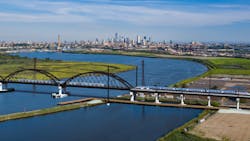NJ Transit Board approves construction contract for North Portal Bridge
The New Jersey Transit (NJ Transit) Board of directors approved a contract with Skanska/Traylor Bros Joint Venture for the construction of the new Portal North Bridge. This is the largest award in NJ Transit's history.
The project, a critical part of the Gateway Program, will eliminate the critical issues caused by operation and maintenance of the existing swing bridge that have long plagued the most heavily transited portion of the Northeast Corridor.
“Few infrastructure projects are as critical to the nation as replacing the aging Portal Bridge,” said New Jersey Gov. Phil Murphy. “With today’s step, NJ Transit is rapidly moving towards beginning the first phase of the largest infrastructure project in the United States. This award will not only bring a bridge that will resolve the long-standing bottlenecks plaguing New Jersey commuters, but will also create well-paying skilled labor jobs in the process. We would not be at this step today without our partners in the Biden Administration, NJ Transit, the New Jersey Department of Transportation, our federal delegation, Amtrak and the state of New York.”
NJ Transit President and CEO Kevin S. Corbett added, “This construction award, which is the single largest in our agency’s history, is the culmination of more than three years of hard work and determination by NJ TRANSIT and our project partners at Amtrak. NJ Transit will soon begin construction on the most important infrastructure project in the nation next to the Hudson Tunnel Project, creating jobs and spurring economic growth for our region, and restoring dependable rail service to the millions of customers who count on this critical rail link between New Jersey and New York every year.”
The $1,559,993,000 construction contract for the project spans 2.44 miles of the Northeast Corridor line and includes construction of retaining walls, deep foundations, concrete piers, structural steel bridge spans, rail systems, demolition of the existing bridge and related incidental works. Once construction begins, the construction contract is anticipated to take approximately five and a half years.
“A new Portal North Bridge that won’t have to open and close for river traffic is vital to improving safety, speed and reliability in the busiest section of the Northeast Corridor,” said Amtrak Board Chair Tony Coscia. “Amtrak is pleased to partner with NJ Transit on this important project that will improve the daily lives of riders and put Americans to work.”
The project is being funded by the U.S. Department of Transportation, NJ Transit and Amtrak. In January 2021, Gov. Murphy announced the signing of a Full Funding Grant Agreement, which secured $766.5 million in Federal Transit Administration funding to support the project’s construction.
Also in January 2021, NJ Transit advertised the Invitation for Bid (IFB) for the construction contract. The procurement was a two-step process, the initial step being the Special Pre-Qualification of Bidders. In May, NJ Transit pre-qualified four bidders and conducted a pre-bid conference and Disadvantaged Business Enterprise outreach. Two of the pre-qualified bidders submitted proposals on Sept. 2. Skanska/Traylor Bros Joint Venture of Queens, N.Y., was deemed the lowest responsible and responsive bidder.
Portal North Bridge project is an important initial element of the broader Gateway Program, which will eventually double rail capacity between Newark and New York. The project will eliminate the existing 110-year-old swing bridge which has been the enduring source of major service disruptions for NJ Transit and Amtrak customers traveling on the Northeast Corridor.
The new bridge is a modern two track, high level, fixed-span bridge that will improve service and capacity along this section of the Northeast Corridor. The new bridge will rise 50 feet over the Hackensack River and will allow marine traffic to pass underneath without interrupting rail traffic.
